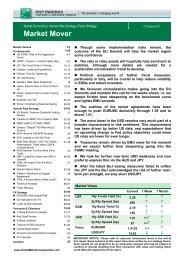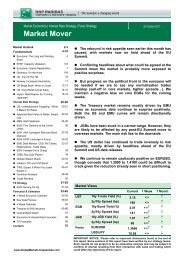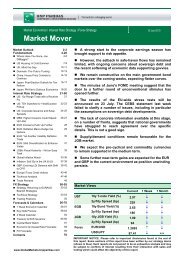Market Economics | Interest Rate Strategy - BNP PARIBAS ...
Market Economics | Interest Rate Strategy - BNP PARIBAS ...
Market Economics | Interest Rate Strategy - BNP PARIBAS ...
You also want an ePaper? Increase the reach of your titles
YUMPU automatically turns print PDFs into web optimized ePapers that Google loves.
have been far less dynamic than sales of goods, and<br />
the impact of weather will generally have been<br />
adverse with the notable exception of winter sport<br />
resorts. We forecast private consumption to rise by<br />
0.5% q/q, with strong import content and the risk of a<br />
slight decline in Q1. We see the sharp decline in<br />
household confidence in December, largely due to<br />
higher prices for food and energy, as the main<br />
source of concern for PCE growth this year.<br />
What do the hard data have to say?<br />
Manufacturing output, after easing 0.2% m/m in<br />
September, fell 0.9% in October because of industrial<br />
action. Despite this poor start to the quarter, the<br />
November rebound, +2.2% m/m, almost guarantees<br />
a rise for Q4. If we assume manufacturing activity<br />
was unchanged in December, total output would be<br />
up 0.5% q/q. This is consistent with 0.5% q/q GDP<br />
growth (Chart 3). Turning to overall industrial<br />
production, the picture became more favourable<br />
each month from September to December. The cold<br />
weather probably caused a further increase in energy<br />
output in December. We forecast IP up 0.2% m/m in<br />
December and up 0.9% q/q in Q4.<br />
Assuming exports and imports were unchanged m/m<br />
in December, exports would rise by 1.1% q/q in Q4<br />
while imports would ease by 0.3%, according to<br />
customs data. This suggests a positive contribution<br />
of foreign trade to growth. However, in Q3, a similar<br />
gap between exports (+6.7% q/q) and imports<br />
(+5.4%) was associated with a negative foreign trade<br />
contribution of 0.5pp. For the last quarter of 2010, we<br />
expect net exports to have made a milder negative<br />
contribution to growth.<br />
Q4 growth in line with recent trend<br />
The Banque de France model repeatedly (i.e. in each<br />
of the three monthly estimates) showed that GDP<br />
growth should reach 0.6% q/q. However, this is a<br />
purely mathematical forecast. The INSEE forecast is<br />
corrected for unusual factors and gives a 0.5%<br />
prognosis. Based on our analysis, which takes into<br />
account the icy weather that may subtract 0.1pp from<br />
growth as well as robust private consumption, we<br />
forecast growth of 0.4% q/q and 1.5% y/y. This would<br />
leave full-year growth at 1.5%, just 0.1pp below the<br />
government’s forecast, unless back data are revised<br />
again (they were lowered in late December).<br />
Keeping an eye on the budget deficit<br />
Q4 growth of 0.4% would leave the acquired growth 1<br />
rate for 2011 at 0.6%, exactly the same as a year<br />
earlier (i.e. acquired 2010 growth as of end-Q4<br />
2009). More importantly, the decline in December<br />
PMIs and household confidence are a clear threat to<br />
Box 1: Snowy Christmas<br />
Heavy snow and a period of very cold weather started in<br />
late November and lasted until the last week of the year.<br />
There is no indication that industrial activity was hit, and<br />
the only impact should be positive in the form of<br />
increased energy output, as households cranked up the<br />
central heating. Of course, snow and icy temperatures<br />
affect construction, but building and construction is only<br />
6.1% of total value-added and this adverse weather is<br />
partly corrected for by seasonal adjustment.<br />
The biggest impact was on services, transport, retail and<br />
leisure, though it is very difficult to measure. In the<br />
transport business, many trains were delayed and some<br />
cancelled, but the impact on activity was limited. Air<br />
France-KLM, the number one carrier in France, said it lost<br />
some EUR 70mn (part of which it may be able to claim<br />
back from airport operators), which is equivalent to only<br />
0.01% of one day’s GDP (the company also reported a<br />
2% increase in passengers vs. December 2009). The<br />
road chaos has been temporary, and merchandise losses<br />
marginal. However, some people may have cancelled<br />
trips planned for Christmas because of adverse weather<br />
conditions. The bottom line is that tourism, leisure,<br />
restaurants and retail sales of food and gifts may have<br />
been the most affected segments. Contrary to most other<br />
economic disruptions, there are very few catch-up<br />
possibilities for this specific weather problem (with one<br />
exception being winter sport resorts).<br />
Conversely, some public services have been facing<br />
heavier workloads, which may result in marginally higher<br />
costs, in particular for overtime (thus output, since the<br />
production of non-merchandise public services is<br />
estimated through their costs). That applies to road<br />
security and safety and for health services, with more<br />
people falling and being hurt.<br />
While it may be noticeable for businesses such as toy<br />
stores, restaurants and airlines, the impact should not be<br />
material in December industrial production or Q4 GDP.<br />
The likely exception is construction, which may subtract<br />
0.1pp from GDP growth in the quarter.<br />
Source: <strong>BNP</strong> Paribas<br />
Q1 growth. If confirmed, these developments will<br />
also be a challenge for the government’s 2011<br />
growth forecast of 2.0%. However, cautious<br />
assumptions regarding fiscal income’s relationship<br />
with GDP growth should allow the 2011 deficit target<br />
to be reached even in the event of some<br />
disappointment on the growth front.<br />
When the central budget deficit for the first eleven<br />
months of 2010 was published this week, the Ministry<br />
of Finance suggested that the 2010 full-year deficit<br />
could be a little below its previous forecast. This is<br />
also an element that will help achievement of the<br />
2011 target.<br />
1 Acquired growth is the full-year growth that would be<br />
obtained assuming every future quarter is flat q/q.<br />
Dominique Barbet 13 January 2011<br />
<strong>Market</strong> Mover<br />
14<br />
www.Global<strong>Market</strong>s.bnpparibas.com

















